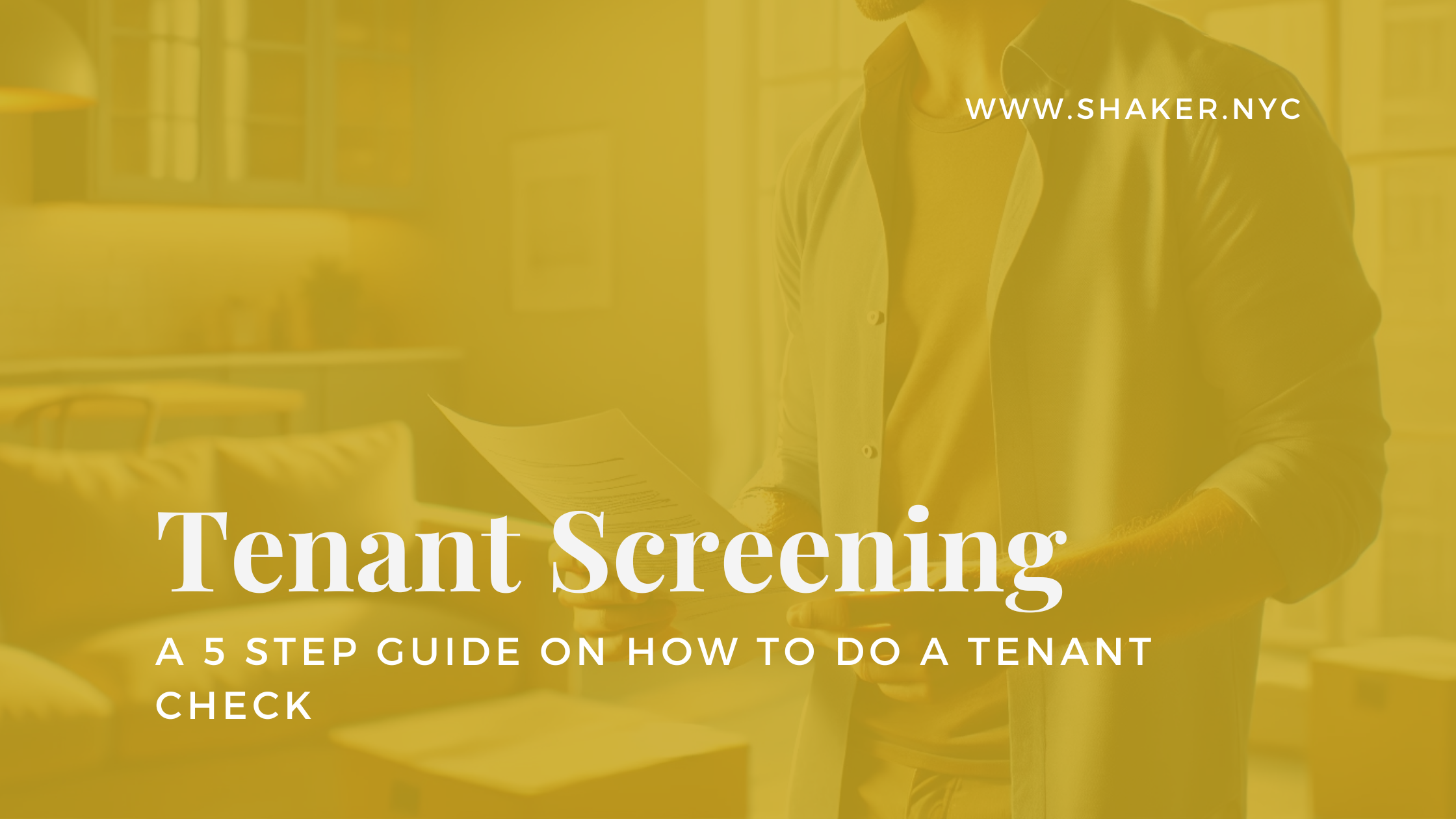Tenant Screening: A 5 Step Guide on How to Do a Tenant Check
Don’t make the mistake of skipping over a proper tenant screening when renting out your property!
Renting out a property in New York City requires careful tenant screening to ensure a smooth and profitable experience. The right tenant will pay rent on time, maintain the property, and comply with the lease terms. A poor tenant, on the other hand, can lead to missed payments, property damage, or legal complications.
This guide outlines the specific criteria landlords in New York city should follow when evaluating potential renters.
1. Meeting NYC’s Income Requirements
Landlord’s typically use the 40x and 80x the rent rules when tenant screening. The rules say the following.
A tenant should earn 40 times the monthly rent in annual income.
For example, if the rent is $3,000 per month, the tenant should earn at least $120,000 per year.
If a tenant does not meet this income threshold, they can enlist a guarantor.
A guarantor should earn 80 times the monthly rent ($240,000 per year for a $3,000 rental).
The guarantor is responsible for covering rent if the tenant fails to pay.
Some tenants may also use institutional guarantors if they do not have a qualified individual to co-sign. Popular third party guarantor services are The Guarantors and Insurent.
NYC and federal fair housing laws prohibit discrimination based on source of income. Applicants with housing vouchers or other lawful sources of income must be considered for landlords to be in compliance with NYC fair housing laws. The 40x rent rule is common, but landlords cannot reject applicants simply for not meeting this rule if they have legal income sources such as housing assistance or subsidies.
2. Financial Screening and Required Documents
Verifying a tenant’s financial stability is essential before approving a lease. A comprehensive financial review ensures that tenants have the income and financial history to meet their rental obligations. As part of the application process, your real estate agent will request and review the following financial documents:
W-2 forms and tax returns to confirm reported income.
Recent pay stubs to verify current employment and earnings.
An employment verification letter from the tenant’s employer to confirm their position and salary.
Recent bank statements to ensure the tenant has sufficient savings and financial security.
Applicants using housing vouchers or government rental assistance programs are already pre-qualified by the state, meaning they do not need to provide additional income verification such as tax returns, pay stubs, or employment letters. Landlords must accept these vouchers as a valid source of income in compliance with NYC fair housing laws.
3. Evaluating Credit History
A tenant’s credit history provides insight into their financial responsibility. A good credit score generally indicates that the applicant has a history of paying bills on time and managing debt effectively.
A credit score of 650 or higher is preferred.
A history of on-time payments, low debt, and responsible credit usage is ideal.
If a tenant has low credit, other factors, such as stable income and significant savings, may compensate for a weaker credit profile.
Evaluating Credit History and Rental Background
A tenant’s credit and rental history provide insight into their financial responsibility and reliability as a renter. A thorough review of both can minimize risk and ensure a stable tenancy. Applicants using housing vouchers or government rental assistance programs cannot be disqualified based on credit history alone. Landlords may still evaluate rental history and overall financial responsibility, as long as they apply the same standards to all applicants.
4. Checking in on Rental History
Contacting previous landlords can provide valuable insight into a tenant’s rental behavior. When checking references, landlords should verify:
On-time rent payments and history of fulfilling lease terms.
Property upkeep to ensure the tenant maintained the unit in good condition.
Any prior lease violations, noise complaints, or other behavioral concerns.
Landlords may check rental history for all applicants, but they cannot deny housing to voucher holders solely due to a lack of rental history.
5. Criminal Background Checks
As of January 1, 2025, new restrictions limit how and when landlords and housing providers can use criminal background checks during the tenant screening process.
Housing providers can only conduct a criminal background check after reviewing a tenant’s general eligibility and making a conditional offer.
Only certain serious criminal convictions can be considered. Most prior arrests and convictions cannot be used to deny housing.
These restrictions apply to covered housing providers, so landlords should ensure compliance before requesting any criminal history information.
6. Additional Requirements for Co-ops and Condos
If the rental property is located in a co-op or condo building, the tenant may need to go through additional approvals from the building’s management or board. These requirements can vary but often include:
Stricter income and credit score requirements.
Additional reference letters from previous landlords or employers.
A potential interview with the co-op or condo board.
While co-ops and condos may have additional approval requirements, they must comply with NYC fair housing laws, including protections for voucher holders and other protected classes. They must apply financial criteria uniformly to all applicants, including voucher holders, in compliance with NYC fair housing laws
7. Assessing Lease Terms
Beyond financials, a qualified tenant should understand and comply with the lease terms and building policies. Landlords should consider the following:
Lease term stability – Long-term leases can help reduce turnover costs, but lease term options should be discussed with applicants fairly, in compliance with fair housing laws, and with consideration for tenant needs.
Pet policies – Pet policies should be communicated upfront. However, landlords must accommodate service and emotional support animals as required by fair housing laws.
Lease Compliance & Community Guidelines – Tenants should be aware of building rules regarding noise, common areas, and maintenance responsibilities.
A well-informed tenant who understands and complies with the lease terms contributes to a stable and positive rental experience.
Set Your Rental Up for Success
Screening tenants properly is the most effective way to protect your investment, reduce risk, and ensure a smooth rental experience. By following this checklist, you’ll be able to identify qualified applicants, avoid common pitfalls, and secure a tenant who pays on time and respects your property.
finding the right tenant is only the first step
How you present your rental can make a huge difference in attracting top-tier renters quickly.
Want to make your listing stand out, and rent faster for even more money?
📩 Download my FREE Rental Listing Optimization Checklist – a step-by-step guide on how to market your rental effectively, including professional photography tips, must-have listing details, and pricing strategies to attract the best tenants.
Click here to grab your free guide and maximize your rental’s visibility in the NYC market!
If you need expert help with renting your property, let’s connect! I’d love to help you find the perfect tenant and get the best return on your investment.








